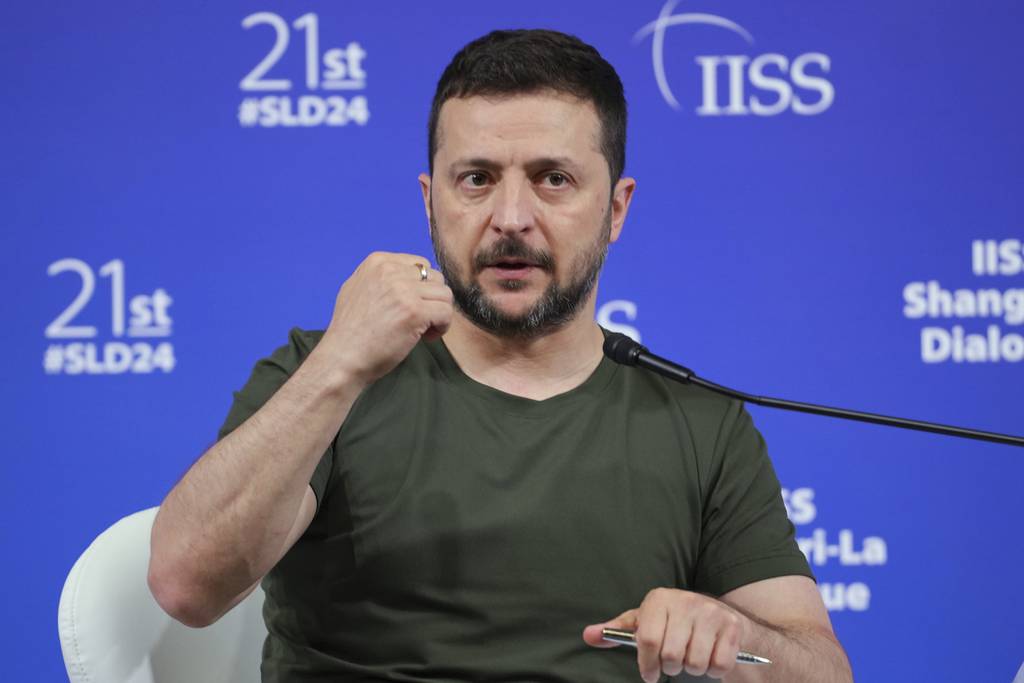
Singapore — Saturday evening, a crowd gathered near the doors of the Shangri-La hotel. They were waiting for a speaker, the last one to be announced at the defense conference held there each year, and one not even from the region.
Ukrainian President Volodomyr Zelenskyy entered to this welcome of cameras and cell phones, wearing his usual T-shirt and fatigue-style pants. The next day, he gave the summit’s final address, casting Ukraine as a global country and Russia’s full-scale invasion as a war of global concern.
“We found ourselves in a war that affects everyone,” he said.
Zelenskyy’s surprise arrival marked the second year of a trend. The Shangri-La Dialogue is Asia’s top defense summit, but since 2022, it’s become more European as officials from the continent see Russia’s war as an omen.
“Europe has woken up about the fact that despite the great geographical distance of the Taiwan Strait to Europe, that the impact [of a war] on Europe’s economy would be enormous,” said Bonnie Glaser, an expert on China at the German Marshall Fund.
And yet, despite this concern, it’s not clear that many Asian officials see the same warning — or that Ukraine is even the war they care about the most right now. Israel’s campaign against the terrorist group Hamas in Gaza matters more to some countries in the region calling for a ceasefire.
There lies the tension with Zelenskyy’s visit. U.S. Secretary of Defense Lloyd Austin the day before described a “new convergence” of countries in the Indo-Pacific that share a set of ideals, such as respect and sovereignty. European officials visiting Singapore share many of those values and are growing more attentive to the region. But the two region’s security concerns are still far from converging.
‘An interest in this region’
Austin himself made this connection in his speech the day before Zelenskyy’s.
The U.S. calls China its top challenge and Austin’s speech reiterated that hierarchy. And yet, while answering questions after his address, Austin pointed to the many European officials in the crowd.
“They’re not in the room because I invited him,” he said. “They’re in the room because they have an interest in this region.”
Countries such as the Netherlands and Germany have temporarily deployed ships to the Indo-Pacific, with a Dutch frigate transiting the Taiwan Strait just before the conference began. Britain also has a more enduring commitment to the region now as part of the AUKUS defense pact, an agreement with the U.S. on nuclear-powered submarines and advanced technology.
Zelenskyy’s arrival was like a crescendo atop these different notes.
Austin met with him and a group of Ukrainian defense officials on the sidelines of the conference. According to a Pentagon readout, they discussed U.S. assistance and pledged to stay at Ukraine’s side. Zelenskyy later wrote on the social media app X that the two discussed air defense and the delivery of F-16 fighter jets, among other issues.
Meanwhile, Austin and others at the conference had already been linking Asian and European interests in reference to China, where companies have supported Russia’s defense industry throughout the war. In a meeting with Chinese Minister of National Defense Adm. Dong Jun, Austin warned that there would be consequences if Chinese companies continued that support.
“He said quite clearly that if China’s support for Russia’s defense sector continues, then the United States with our allies will have to take further measures,” a senior American defense official told reporters afterward, declining to elaborate further.
A linkage?
Several countries in the region also see their interests in Europe.
Japan, Australia and South Korea are among the countries that have supported Ukraine during the war, whether through aid, sanctions or equipment. Taiwan sees Russia’s invasion as a potential harbinger of a potential attack from China, which considers the island a rogue breakaway province.
“This was a topic of conversation in all of our meetings in Taiwan, whether or not we stand by Ukraine,” said Sen. Chris Coons, D-De., who co-chaired a congressional delegation to the island and then Singapore, in an interview.
But not all countries in the region agree with this linkage.
“Taiwan is not Ukraine and neither is China Russia,” said Singapore defense Minister Ng Eng Hen in a speech just before Zelenskyy’s.
And while many of the speakers referenced Ukraine, the war in Gaza also loomed over the conference. The president-elect of Indonesia, which has a large Muslim population, said his country was ready to send a peacekeeping force to the strip to maintain a ceasefire. The first question Zelenskyy got after his speech was about Ukraine’s stance on Israel.
Notwithstanding, Zelenskyy continued to argue that the audience should care about Russia’s war. His speech described the conflict as global, discussing partners supporting Kyiv from outside NATO and also the effects of Russia’s aggression elsewhere, such as the food scarcity it created for northern Africa.
“We need the support of Asian countries,” Zelenskyy argued.
That doesn’t mean he expects more countries to send Ukraine weapons. In a Q&A after his speech, he mentioned a “peace summit” Ukraine is holding in Switzerland later in June as an example of non-military ways to contribute. That said, he didn’t seem to be taking it for granted.
Ending his speech, he thanked Singapore for the invitation to the conference, and then he addressed the crowd.
“Thank you for your attention,” Zelenskyy said.
Noah Robertson is the Pentagon reporter at Defense News. He previously covered national security for the Christian Science Monitor. He holds a bachelor’s degree in English and government from the College of William & Mary in his hometown of Williamsburg, Virginia.
- SEO Powered Content & PR Distribution. Get Amplified Today.
- PlatoData.Network Vertical Generative Ai. Empower Yourself. Access Here.
- PlatoAiStream. Web3 Intelligence. Knowledge Amplified. Access Here.
- PlatoESG. Carbon, CleanTech, Energy, Environment, Solar, Waste Management. Access Here.
- PlatoHealth. Biotech and Clinical Trials Intelligence. Access Here.
- Source: https://www.defensenews.com/pentagon/2024/06/02/the-question-behind-zelenskyys-visit-are-europe-and-asia-converging/



